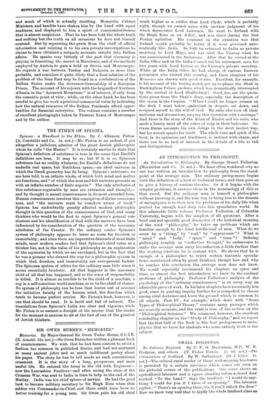srE OWEN RUNE'S "MEMORIES."
Memories. By Major-General Sir Owen Tudor Burne, G.C.I.E. (E. Arnold. 15s. net.)—Sir Owen Burne has written a pleasant book of reminiscences. We wish that be had been content to avoid a fashion too common in published diaries, and had not scattered so many ancient jokes and so much indifferent poetry about his pages. The story he has to tell needs no such conventional ornament. It is the story of a long, prosperous, and most useful life. He entered the Army in the old 20th Regiment— now the Lancashire Fusiliers—and after seeing the close of the Crimean War, was sent to India in time to help in the end of the Mutiny. India was his chief sphere of service. He had the good luck to become military secretary to Sir Hugh Rose when that soldier was Commander-in-Chief, and there could have been no better training for a young man. Sir Owen puts his old chief much higher as a soldier than Lord Clyde, which is probably right, though we cannot agree with another judgment of his which depreciates Lord Lawrence. He went to Ireland with Sir Hugh Rose as an A.D.C., and was there during the first Fenian agitation. His comment on the situation was that Ireland would probably be better if it were governed- auto- cratically like India. In 1866 he returned to India as private secretary to Lord Mayo, and was with the Viceroy when he was assassinated in the Andamans. After that ho served at the India Office and on the India Council till his retirement, save for two years with Lord Lytton as the Viceroy's private secretary. While at the India Office he had charge of various Eastern potentates who visited this country, and these chapters of his Memories are strewn with good stories. Excellent, for example, is his account of the boxing match got up to please the Shah in Buckingham Palace gardens, which was dramatically interrupted by the arrival of Lord Shaftesbury ! Good, too, are the quota- tions given from the Shah's diary, especially the description of the storm in the Caspian. "When I could no longer remain on the deck I went below, undressed in despair, sat down, and resigned myself to the will of God. My suite also took off their uniforms and decorations, varying this operation with vomitings." And there is the story of the Khan of Khelat and his suite, who made a hearty meal off the cakes of soap in their bedrooms. Sir Owen Burne recounts his own doings in the most modest way, but his record speaks for itself. The whole tone and spirit of the book, in its optimism and kindliness, is instinct with charm, and there can be no lack of interest in the details of a life so full and distinguished.






























































 Previous page
Previous page